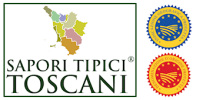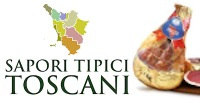Our network:
Sunday 22 December 2024
San Quirico d’Orcia - the old town centre
Settled originally by the Etruscans, San Quirico d’Orcia stands on a hill that divides the Valle dell’Asso and the Valle d’Orcia.
The entire Medieval town of San Quirico has remained intact through the centuries, including the 15th century fortifications and their 14 defence towers.
Via Dante Alighieri corresponds to the urban section of the Via Francigena, or Via Romea.
The magnificent Collegiata church dedicated to St Quirico and St Giuditta faces onto this street and was built in the 12th century over a previously existing Romanesque church. Its two majestic Romanesque entrances are decorated with relief work and sculptures.
The interior contains a precious inlaid wood choir by the Senese Antonio Barili, as well as a triptych attributed to Sano di Pietro, depicting the Madonna With Child Enthroned With Four Saints.
Adjacent to the Collegiata stands the elegant Palazzo Chigi-Zondadari, which dates from the 17th century and contains mural paintings of the Roman School. The former Palazzo Pretorio, today the Centro Accoglienza of the Val d’Orcia Park, stands next door.
The Corso ends in Piazza della Libertà, with the Church of San Francesco that contains a statue of the Madonna by Andrea della Robbia.
In the square there is also the entrance to the 16th century formal gardens known as the Horti Leonini, after their first owner Diomede Leoni. The remains of the town’s Medieval keep, which was partly destroyed during bombardments in World War Two, stand in the higher part of the gardens.
With its typical Medieval houses, Via Poliziano leads to Porta dei Cappuccini, a massive crenellated tower.
As well as boasting artistic and natural treasures of considerable interest, San Quirico is also known for its pici, or pinci – a large variety of spaghetti made with flour and water that is fried up in a pan with garlic and hardened bread.
The entire Medieval town of San Quirico has remained intact through the centuries, including the 15th century fortifications and their 14 defence towers.
Via Dante Alighieri corresponds to the urban section of the Via Francigena, or Via Romea.
The magnificent Collegiata church dedicated to St Quirico and St Giuditta faces onto this street and was built in the 12th century over a previously existing Romanesque church. Its two majestic Romanesque entrances are decorated with relief work and sculptures.
The interior contains a precious inlaid wood choir by the Senese Antonio Barili, as well as a triptych attributed to Sano di Pietro, depicting the Madonna With Child Enthroned With Four Saints.
Adjacent to the Collegiata stands the elegant Palazzo Chigi-Zondadari, which dates from the 17th century and contains mural paintings of the Roman School. The former Palazzo Pretorio, today the Centro Accoglienza of the Val d’Orcia Park, stands next door.
The Corso ends in Piazza della Libertà, with the Church of San Francesco that contains a statue of the Madonna by Andrea della Robbia.
In the square there is also the entrance to the 16th century formal gardens known as the Horti Leonini, after their first owner Diomede Leoni. The remains of the town’s Medieval keep, which was partly destroyed during bombardments in World War Two, stand in the higher part of the gardens.
With its typical Medieval houses, Via Poliziano leads to Porta dei Cappuccini, a massive crenellated tower.
As well as boasting artistic and natural treasures of considerable interest, San Quirico is also known for its pici, or pinci – a large variety of spaghetti made with flour and water that is fried up in a pan with garlic and hardened bread.
Booking.com
• Siena in the Renaissance
• Siena in the Middle Ages
• Siena in Antiquity
• Town Map Siena
• Farm Holidays and Country Houses
• Residence, Apartments
• Bed & Breakfasts
• Historical Residences
• Last Minute Siena
• Restaurants
• Pubs & Wine Bar
• University for Foreigners
• Palazzo Chigi-Saracini
• Palazzo d’Elci degli Alessi
• Loggia della Mercanzia
• Palazzo Sansedoni
• Palazzo Chigi-Zondadari
• Fonte Gaia fountain
• Carthusian Monastery of Pontignano
• Forte di Santa Barbara
• The Duomo – The Cathedral of the Assunta
• Church of the Osservanza
• The Oratory of San Bernardino
• Church of San Francesco
• Short Biography of St Catherine of Siena
• St Catherine Sanctuary
• Church of S. Niccolò al Carmine
• Bologna-Buonsignori museum
• Accademia dei Fisiocritici
• I Musei Senesi
• The Palazzo Pubblico and the Torre del Mangia
• Piazza del Campo
• The Montagnola Senese and the Fortified Village of Sovicille
• The Castles of Belcaro and Quattro Torri
General information
• Town map • Siena in the Renaissance
• Siena in the Middle Ages
• Siena in Antiquity
Transport in town
• Map of Hotels in Siena • Town Map Siena
Transport out of town
• Train services
Where to Stay
• Hotels • Farm Holidays and Country Houses
• Residence, Apartments
• Bed & Breakfasts
• Historical Residences
OFFERS & LAST MINUTE
• Reservation Services Siena • Last Minute Siena
Where to eat and drink
• Disco Dancing • Restaurants
• Pubs & Wine Bar
Education
• Siena University • University for Foreigners
Art and monuments
• Palazzo Piccolomini and Palazzo delle Papesse • Palazzo Chigi-Saracini
• Palazzo d’Elci degli Alessi
• Loggia della Mercanzia
• Palazzo Sansedoni
• Palazzo Chigi-Zondadari
• Fonte Gaia fountain
• Carthusian Monastery of Pontignano
• Forte di Santa Barbara
Art and religion
• Church of Sant’Agostino • The Duomo – The Cathedral of the Assunta
• Church of the Osservanza
• The Oratory of San Bernardino
• Church of San Francesco
• Short Biography of St Catherine of Siena
• St Catherine Sanctuary
• Church of S. Niccolò al Carmine
Museums and galleries
• The Museo Civico • Bologna-Buonsignori museum
• Accademia dei Fisiocritici
• I Musei Senesi
Art and tourist attractions
• Cappella di Piazza • The Palazzo Pubblico and the Torre del Mangia
• Piazza del Campo
• The Montagnola Senese and the Fortified Village of Sovicille
• The Castles of Belcaro and Quattro Torri
Booking.com
• The July and August Palio
• The Contrade
• The Days of the Palio
• The Drappellone
• The Eve of the Palio
• The Corteo Storico Procession
• The Race
• The Patron Saint and Oratory of Each Contrada
• Weekly Appointments in each Contrada from April onwards
• Croce del Travaglio Place
• From Piazza del Campo to the Duomo Along Via di Città
• The Curves of Piazza del Campo
• Costarella dei Barbieri street
• Borgo d’Ovile
• The Terzo of Camollia – main streets
• Casato di Sopra e Casato di Sotto
• Terzo di San Martino district
• The Terzo di Città District - Via Stalloreggi, Via San Quirico
• The Terzo di Città District – The Pinacoteca Nazionale
• Golf courses in Siena and Tuscany
• Wedding in Tuscany - Siena area
• San Casciano dei Bagni
• Chianciano Terme
• Bagni San Filippo
• Bagno Vignoni
• Rapolano Terme - Baths of San Giovanni and Baths of the Antica Querciolaia
• The Countryside around Siena and its Thermal Water Springs
• SkiPass Monte Amiata
• WebCam sul Monte Amiata
• Meteo Monte Amiata
• The Val d’Orcia and Its Main Towns
• Pienza - the old town centre
• Montepulciano - the old town centre
• San Quirico d’Orcia - the old town centre
• Montalcino and the Land of Brunello
• The Abbey of Monte Oliveto Maggiore and the Crete
• The Crete Senesi
• Castellina in Chianti and the Via Chiantigiana Towards Siena
• Siena and Southern Chianti - from the Castle of Montalto to the Castle of Brolio and on to the Castle of Meleto
• The Chianti Hills - Monte Calvo, Monte Luco and Monte San Michele
• Cortona and the Valdichiana
• San Gimignano - The old town centre and its major sights
• The Val d’Elsa - Monteriggioni and Colle di Val d’Elsa
• Along the Old Via Francigena
• Oleum Evo online selling
• Sapori Tipici Italiani buy online now
• il Prosciutto Cotto
The Palio of Siena
• The Origins • The July and August Palio
• The Contrade
• The Days of the Palio
• The Drappellone
• The Eve of the Palio
• The Corteo Storico Procession
• The Race
• The Patron Saint and Oratory of Each Contrada
• Weekly Appointments in each Contrada from April onwards
Sightseeing
• Via di Città (formerly Via Galgaria), Siena’s Most Elegant Street • Croce del Travaglio Place
• From Piazza del Campo to the Duomo Along Via di Città
• The Curves of Piazza del Campo
• Costarella dei Barbieri street
• Borgo d’Ovile
• The Terzo of Camollia – main streets
• Casato di Sopra e Casato di Sotto
• Terzo di San Martino district
• The Terzo di Città District - Via Stalloreggi, Via San Quirico
• The Terzo di Città District – The Pinacoteca Nazionale
What to see & do
• Wedding in Siena • Golf courses in Siena and Tuscany
• Wedding in Tuscany - Siena area
• San Casciano dei Bagni
• Chianciano Terme
• Bagni San Filippo
• Bagno Vignoni
• Rapolano Terme - Baths of San Giovanni and Baths of the Antica Querciolaia
• The Countryside around Siena and its Thermal Water Springs
Monte Amiata
• Monte Amiata - nature tourism the year round • SkiPass Monte Amiata
• WebCam sul Monte Amiata
• Meteo Monte Amiata
Specials - Out of town
• Gift Ideas for traveling • The Val d’Orcia and Its Main Towns
• Pienza - the old town centre
• Montepulciano - the old town centre
• San Quirico d’Orcia - the old town centre
• Montalcino and the Land of Brunello
• The Abbey of Monte Oliveto Maggiore and the Crete
• The Crete Senesi
• Castellina in Chianti and the Via Chiantigiana Towards Siena
• Siena and Southern Chianti - from the Castle of Montalto to the Castle of Brolio and on to the Castle of Meleto
• The Chianti Hills - Monte Calvo, Monte Luco and Monte San Michele
• Cortona and the Valdichiana
• San Gimignano - The old town centre and its major sights
• The Val d’Elsa - Monteriggioni and Colle di Val d’Elsa
• Along the Old Via Francigena
Typical products
• Typical Tuscan flavours • Oleum Evo online selling
• Sapori Tipici Italiani buy online now
• il Prosciutto Cotto









